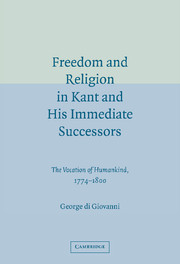Book contents
- Frontmatter
- Contents
- Preface
- Abbreviations
- 1 Introduction: The Vocation of Humankind, 1774
- 2 The Taming of Kant: Popular Philosophy
- 3 The Intractable Kant: Schultz, Jacobi, Reinhold
- 4 Of Human Freedom and Necessity
- 5 Kant's Moral System
- 6 The Difference That Fichte Made
- 7 The Parting of the Ways
- 8 The Vocation of Humankind Revisited, 1800: Conclusion
- Notes
- Bibliography
- Index
8 - The Vocation of Humankind Revisited, 1800: Conclusion
Published online by Cambridge University Press: 24 July 2009
- Frontmatter
- Contents
- Preface
- Abbreviations
- 1 Introduction: The Vocation of Humankind, 1774
- 2 The Taming of Kant: Popular Philosophy
- 3 The Intractable Kant: Schultz, Jacobi, Reinhold
- 4 Of Human Freedom and Necessity
- 5 Kant's Moral System
- 6 The Difference That Fichte Made
- 7 The Parting of the Ways
- 8 The Vocation of Humankind Revisited, 1800: Conclusion
- Notes
- Bibliography
- Index
Summary
“Your vocation is not merely to know, but to act according to your knowledge”: this is loudly proclaimed in the innermost depths of my soul, as soon as I recollect myself for a moment and turn my observation inward upon my self. “You are here, not for idle contemplation of yourself, or for brooding over devout sensations – no, you are here for action; your action, and your action alone, determines your worth.”
FichteThe practical reason is the root of all reason. […] I am hungry, not because food is before me, but a thing becomes food for me because I am hungry; similarly, I act as I do not because a certain end is to be attained, but the end becomes an end to me because I am bound to act in the manner by which it may be attained.
FichteEverything that is is good and absolutely legitimate. There is but one world possible – a thoroughly good world.
FichteVoltaire's procedure is an authentic example of sane sound sense which Voltaire possessed in such high measure, while others babble about it all the time in order to pass off their insanities as sound sense.
HegelNEW BOOK, OLD THEMES
In January 5, 1795, writing from his Tübingen seminary, Schelling bitterly complained to his friend Hegel:
Here there are Kantians in droves. […] All imaginable dogmas have been stamped as postulates of practical reason, and wherever theoretical and historical proofs are lacking, the practical Tübingian reason cuts the knot. […] Before you know it, the deus ex machina pops up, the personal individual being who sits up there in heaven!
- Type
- Chapter
- Information
- Freedom and Religion in Kant and his Immediate SuccessorsThe Vocation of Humankind, 1774–1800, pp. 271 - 300Publisher: Cambridge University PressPrint publication year: 2005

